
One of the unending debates in games is whether memory is a valid skill. I've always found this argument silly.
The people against memory usually invoke the term "trackable information" as an argument against memory. Essentially, if you can take pen and paper and take notes on (usually random) elements of a game in order to keep track of what has appeared and what hasn't, then that information should be open. A good example of this is RA's random tile draw. The initial tile distribution is random, so if you have a tracking sheet and tick off each tile as it appears, then you should have an exact inventory of what remains in the bag.
A closely related argument to this is "countable information" wherein all the game elements are out in the open except for one, and that hidden element can be determined by counting known elements and calculating. For example, the number of caballeros in El Grande's castillo, or the amount of cash each person has in Power Grid are examples of countable information. Countable information is always also trackable.
Now, I don't know if the people who want to keep this information out in the open are just bad at remembering things, so they don't want to be disadvantaged. Memory is a valid gaming ability, just as spatial reasoning or strategic brilliance or mathematical ability or word association or a vast reserve of trivia in your head. Is memory just as valid a source of competitive advantage as the ability to think four moves ahead or the ability to crunch numbers in your head accurately? Of course it is.
For example, if Karl-Heinz Schmiel wanted all players in a game of Die Macher to always know how much money each party had at any time, he would have either built it into his game mechanisms or components, or mentioned in the rules that players should keep track of everyone's cash with pen and paper. (Note that Die Macher is a game where you already need pen and paper for scoring and bidding. Money in this game is trackable information.) Therefore we can infer that Schmiel wanted players who can keep track of money in their head to have some advantage in bidding for the Opinion Polls, especially in the final election. You make that information freely avaialble to all players, and you remove a source of competitive advantage from the player with good memory that is granted to him by the game rules.
Unless the rules explicitly state that players should keep track of something with pen and paper, it is assumed that either players use their memory to maintain count or recount the game elements on the board when necessary. I know that many groups hate it when someone starts counting caballeros in order to determine how many of them are in the castillo. However, this is part of the game and is therefore part of the design. If you play El Grande, you get to count the caballeros anytime you damned well please. (This is one of a few reasons I'm not enamored of El Grande.)
If you insist on playing a game against the rules (like the very silly house rule to use open scoring in Euphrat & Tigris) then you are playing a variant that eliminates an important game element - memory. You (and your gaming group) might all agre to play it that way. That's fine. Just be aware that you're applying a variant house rule that tinkers with the way the game was designed, and are therefore playing a different game than the rest of us who play with the rules as published.
2 comments:
I like to think of games with a memory element not so much as games where I need to TRY to remember exact money or cube counts, but where I can use some intuition. I have much more fun playing by the seat of my pants (I think I have more money than him, and less than her) than painstakingly calculating exact figures. In fact, having those totals available to me leads to more AP.
I pretty much agree with ekted. If the information is hidden, I don't bother tracking it. If it's open, I do track it and the game takes longer.
In general, I think hidden VPs is an excellent mechanic, because it causes people to play to maximize their score instead of their position. I do this anyway, but it's nice when others do as well.
Hidden resources is sometimes a good mechanic, but other times it's important to know what everyone's capabilities are.
Post a Comment